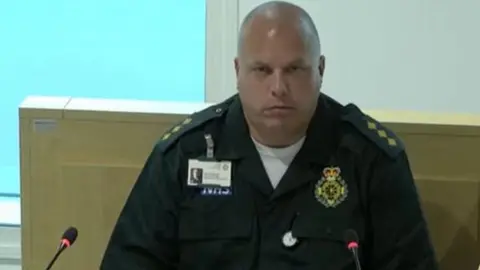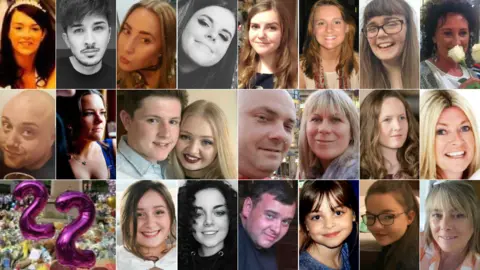Manchester Arena Inquiry: Arriving ambulance staff 'prioritised injured'
 Manchester Arena Inquiry
Manchester Arena InquiryAmbulance staff arriving to help after the Manchester Arena bomb prioritised treatment over taking casualties to hospital, the attack inquiry has heard.
The Manchester Arena Inquiry was told 14 people were not put on ambulances until three hours after the attack.
Ambulance manager James Birchenough, who arrived 40 minutes after the blast, said there were "patients everywhere".
He agreed three hours sounded like "a very long time" but said there had been good reasons for any delays.
Twenty-two people were killed and hundreds more injured when Salman Abedi detonated a homemade device in the venue's City Room foyer at 22:31 BST on 22 May 2017, one minute after an Ariana Grande concert ended.
The inquiry was told 14 critically-injured people were not put on ambulances until after 02:00 on 23 May and that a lack of ambulance staff may have contributed to the delay.
Mr Birchenough, who works for North West Ambulance Service (NWAS), said on arriving at the scene, 40 minutes after the explosion, he had not known "whether we had enough people initially for every patient, so initially they were involved in treatment rather than transportation".
"Some of the treatments that patients got were quite extensive, to make them stable enough to be transported," he said.
He accepted the delays in getting patients to hospital sounded like "a very long time", but said they were likely to have been caused by a combination of reasons.
"I'm sure had we had a bigger area, had we had more staff on scene, had various things been slicker, those times would have been shorter," he said.
The inquiry heard it took more than an hour to get confirmation on which hospitals would be able to take patients and how many they could accommodate, as part of the NWAS's Mass Casualty Plan.
 Family handouts
Family handoutsMr Birchenough, who was put in charge of the casualty clearing site on the adjacent Manchester Victoria station concourse, said "priority one" and "priority two" casualties were mixed together, but the system of triaging, treatment and eventual transportation was effective.
"Once we'd got the poorliest patients away, I felt the process that we had was working," he said, adding that he did not feel paramedics had been "losing track of the grading of those patients".
He added that he felt there had also been enough medical staff and equipment to care for the injured.
"Certainly within the first 30 minutes, there were more people and more equipment coming into the station rapidly," he said.
"I never had a concern... I didn't request more people as I knew more people were coming."
In his written statement to the inquiry, Mr Birchenough said he was "immensely proud" of how his team responded to the incident.
Fellow NWAS commander Matt Calderbank, who managed the loading of patients onto ambulances outside the arena, told the inquiry that initially the ambulance response did not have "the number of resources that was required".
He said the initial difficulty had been in "providing clinicians to look after these people with devastating injuries" and paramedics arriving in the first ambulances would have been tied up giving "one-to-one care".
The inquiry continues.

Why not follow BBC North West on Facebook, Twitter and Instagram? You can also send story ideas to [email protected]
